Review for Final Fantasy VII Remake. Game for PlayStation 4, the video game was released on 10/04/2020
The word “remake” has always been the catalyst for endless discussions both in the gamer community and in specialized newsrooms. Unresolved discussions between those who dream and clamor for re-editions of their favorite games and those who instead look at them with indifferent eyes, considering them only gimmicks to obtain earnings with little effort. A debate that in recent years has been enriched with convincing and much less "useless" exponents such as Metroid: Samus Returns, Yakuza Kiwami and Resident Evil 2. Of Square Enix it can certainly be said to have been prolific over the years in terms of remake, remaster and various ports, as well as having made several missteps. But for Final Fantasy VII Remake the speech is very different and decidedly non-trivial.
Claimed by fans since the days of PS2, the re-release of the seventh chapter of the flag saga has always been evaded by Square Enix mainly for two important reasons: the first concerns the technical restrictions (which unfortunately few can understand) that have always prevented make a makeover of what is a huge game, simply impossible to recreate with modern graphics for any classic format; the second is the awareness of the importance that Final Fantasy VII holds not only as a cornerstone of the industry, but especially in the hearts of the players. Square Enix knew that a simple graphic update of a game from 1997 would not have done justice to the work in our imagination, risking to be a barely discreet product, a blatant missed opportunity.
In the end, the path was chosen with the least compromises, the most intrepid, even reckless: not necessarily being able to enclose all the original work in a single game, it was decided to divide it into chapters and, with the opportunity, to make the most of the broad scope established to create something unique. A title that digs into the roots of the original game and brings to light many things that have remained undefined, unspoken, hinted at, even missed, exponentially deepening the world and its protagonists. So get out of your head the idea of finding yourself in front of a remake like many others or a project made to save funds: the creative effort and dedication of the developers is palpable.
Square Enix has tried to walk in the balance between respect for the original work and a certain readjustment of the canon, probably to avoid the fans feeling “already seen”, and therefore also deliver to them an adventure that could still be fresh. In some respects the operation is successful, in others perhaps a prohibited threshold has been stepped on. With all the uncertainties about the future inherent in this atypical project, the first chapter of Final Fantasy VII Remake is like the edge of a very long slide: exciting and scary at the same time, a edge to overcome with a desire for adrenaline accumulated over years of waiting, but trying not to think that the final fall could hurt.
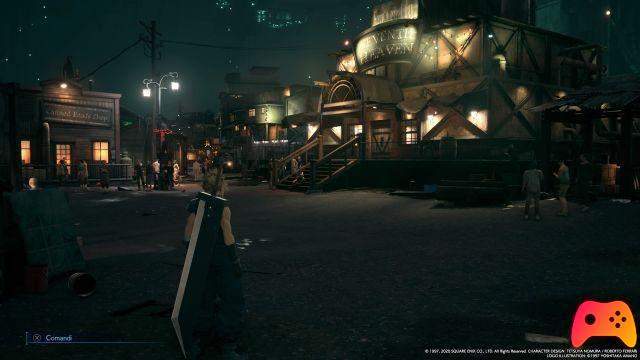
We have already talked about it a lot, but just for the sake of clarity we reiterate it: yes, Final Fantasy VII Remake is only the first chapter of a long-term project and covers the events that go from the beginning of the game to the escape from Midgar. And to officially deny the skeptics: no, it is not an "incomplete" game, nor does it last a short time. We affirm this after having spent there more than 40 hours and with still many endgame challenges ahead.
This dilation is due to two main reasons. The first is that the original Final Fantasy VII was a very small aspect ratio game, a legacy of classic JRPGs that condensed large areas into a small screen space. Suffice it to say that the slums of Sector 7 consisted of a single pre-rendered background, another for the crossroads with the pillar and a third for the station. From the perspective of a modern title it would have been ridiculous to have us cross an entire sector of the largest city on the planet in a few seconds, so rightly Square Enix has recreated the game environments with proportions that are realistic to the size of the protagonists. Apply this concept to the whole game and add the second reason: as already mentioned, the development team did not want to do "the homework" by merely recreating what has already been seen, but wanted expand and enrich the environments. The Midgar sectors that we will pass through are no longer small scenarios inhabited by a handful of NPCs, but are larger and more articulated, realistic, multifaceted and populated by dozens of inhabitants whose chatter you can hear passing by, transmitting much more than in the past thoughts and inconveniences of the city.
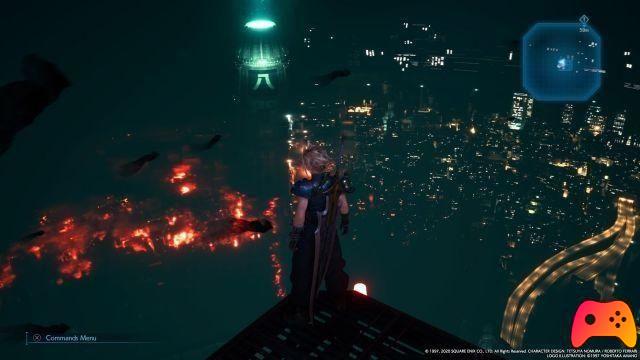
Everything is supported by a simply spectacular graphic sector. Unreal Engine 4 has been properly squeezed to create richly detailed environments and detailed polygonal models. Several characters are characterized by a particular expressiveness that gives them an unprecedented depth of characterization. Wanting to be picky and going to look in detail, sometimes it happens to notice elements of lower quality that clash in the rest, but these are isolated cases.
As you can also see that some settings and dungeons are quite linear, but it must be taken into account that even the original game was definitely one-way. After all, the claustrophobic slums of Midgar and its industrial structures hardly adapt to open world flashes; without considering the excessive contrast with the original that would have resulted. On all dominates a admirable use of lights and shadows which helps to embellish the settings and cutscenes with strong suggestions.
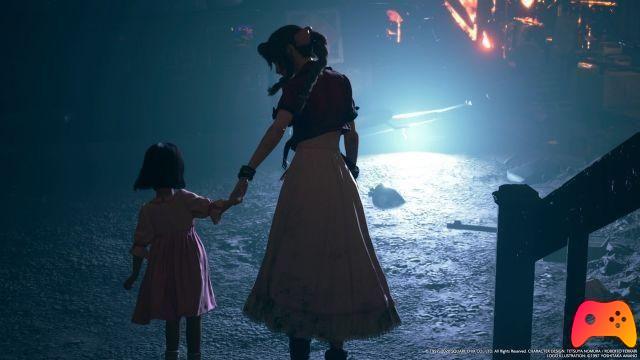
The art direction is almost perfect in recreating Midgar in a splendor and opulence that we could only dream of. Several times we paused to admire the landscapes dripping with memories and new beauty, and our thumb inevitably ended up on the screenshot button several times.
The fear that the city alone would offer a scarce variety of atmospheres was averted both by the addition of new locations and dungeons, and by the fact that we will have the opportunity to see some sectors both by night and by day, with sometimes considerable differences ( wait until you see the Wall Market in the morning).
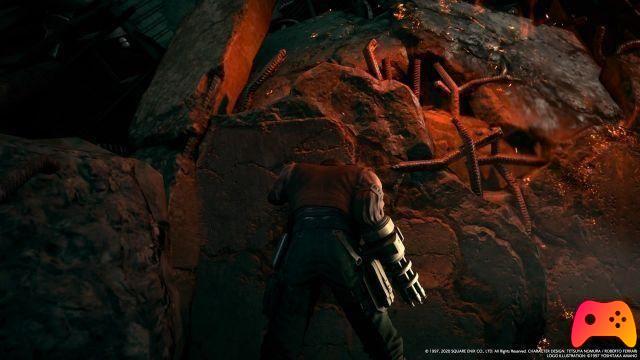
To make the adventure of Final Fantasy VII Remake longer, there are also some new story and gameplay segments inserted among the already known events. To give an example, trying not to spoil you too much, one of the new missions will see us in the company of Jessie, Biggs and Wedge and will be an opportunity to worthily enhance these characters as memorable as, actually, just touched in the original game.
The expansion work extends to all elements of the game and means an in-depth study not only of the locations and dungeons, but also of the events and of the characters who now have more breath and opportunity to communicate their thoughts and characters to us. The scenes of the original of a handful of dialogues surrounded by a few essential animations in the Remake have been translated into cutscenes with a certainly more effective directorial cut, more intense moments in which we can better read the moods in the faces of the protagonists. Obviously, the expressiveness and depth of the characters themselves, as well as the immersion and transport of the player, are above all to gain.
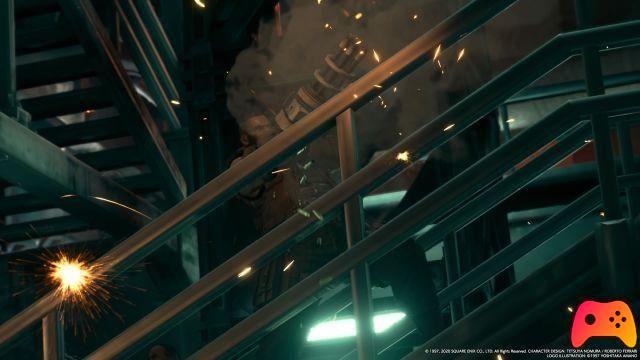
As anticipated, Square Enix has retraced all the main events of Final Fantasy VII, but in this Remake it has made changes to some details of the storyline. In some cases the changes are slight, or only slightly displaced, in others they find a sense in wanting to "straighten out" scenes from the original objectively unlikely (for example, President Shinra who shows himself within range of Barret's machine gun), in others still make it possible to tackle important subtexts and themes of the game.
In several cases these are scenes that show us parts of the original narrative that had remained "hidden", events that occurred while our protagonists were doing something else. Still others add a further depth to some elements just mentioned in the past, such as the more active inclusion of hooded individuals, or the cutscenes dedicated to the Turks.

It is not said that all the changes will obviously please you, and especially the most purist fans could turn up their mouths in front of certain choices. The presence of Sephiroth as a mental personification of Cloud's trauma is effective in giving greater depth to the protagonist's psyche, but for some it can be an unwelcome interference.
Even the infamous Guardians of Fate, sometimes hostile and other cooperative, are an intrusive presence that on the one hand represents a good way to intrigue and displace even those who already know the original story, creating an unknown to follow in the adventure; on the other hand, they always leave one prey to a confusion that persists until the end of the game, not fully explaining the why and purpose of their presence.
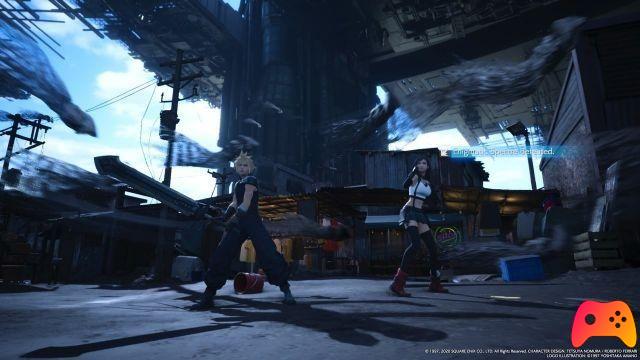
So we come to a crucial point in our judgment of the story and the title in general. Let us tell you: net of changes and additions, reliving the events of Cloud & Co. was an indescribable emotion. And it was a pleasure to see a game that we believe is important in our memory as gamers being so embellished and honored in every corner (with the exception of the dance scene at the Honey Bee Inn, but they are tastes).
The story of Final Fantasy VII after twenty-three years is still effective and current, indeed in these times various important themes such as environmental degradation, economic imbalance, social contrast, control of consciences through the media, but also more intimate and moral themes. Not to mention the facets and personal stories of the characters we are fond of. The memorable scenes we know come back with renewed vigor and dramatic power, and have been able to move us on more than one occasion. Final Fantasy VII Remake will make you cry, laugh and elated.
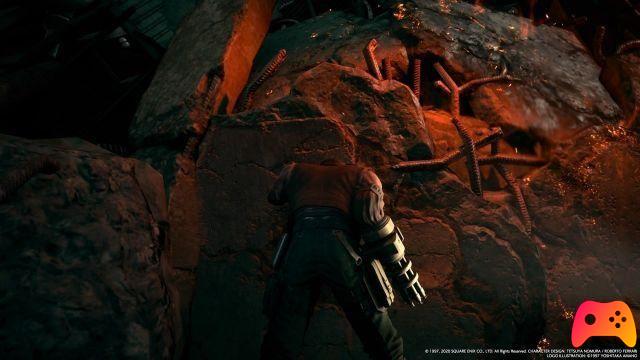
All good or bad works until the Hardy Daytona's freeway chase is over, at what one would expect to be the end of the adventure, or nearly so. It is at this point that the events take an unexpected turn, which goes far beyond the relative interventions seen up to that moment on the storyline. It is really difficult to give an idea of what we are talking about while avoiding spoilers. Where we would have expected a simple additional boss battle to give the chapter a more iconic closure, we instead found ourselves a final battle with a style in full contrast with everything that could be expected from Final Fantasy VII. A fold, and we are sorry to sound controversial, that blatantly betrays the hand of a Tetsuya Nomura unable to put aside the stylistic features of Kingdom Hearts and Advent Children. Inability that clashes, hurts and brings out of focus what is the spirit of the starting title.
There is not only a problem of directing, but in its final stages the plot slips ruinously showing us absolutely unnecessary and "wasted" scenes, and clues that if you want to think carefully are only provocative winks to incite old-time players not to expect a predictable continuation of future history. To want to think badly, however, could be the signs of a choice that would risk heavily distorting the canon of the original work, veering towards an indigestible “what if”. Whatever the real intent of the director for the future of the project, we found the conclusion of the game inappropriate and inauspicious.
In addition to not being able to tell you more, it should be noted that nothing is actually defined and we are left with only fears and assumptions that for now remain so. Let it be clear that the ending was disappointing, but it does not erase the good things in Final Fantasy VII Remake up to that point. Unfortunately, even this is the main reason why we have significantly lowered what could have been a much higher rating.
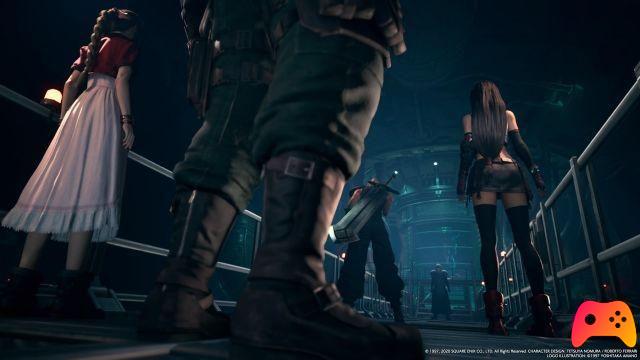
Putting concerns for the future aside, it is worth spending a few words on the gameplay side. On the mechanics of the game we have already made rivers of words flow in our repeated hands-on at E3 2019, at the Gamescom of the same year and at the preview event, so we will avoid repeating aspects that are now abundantly explained. With the experience of the whole game on our shoulders, however, we want to untie a few unfinished knots. Although Final Fantasy VII Remake is fully an action-RPG, don't expect a title in which to go ahead by blindly tapping the attack button. Especially in the most difficult clashes it will be necessary to observe the opponents well and steal their attack patterns if you do not want to find yourself with the HP drained in a short time.
Equally important will be the timeliness with which you manage the party mates. These left in the hands of the AI of the game will not be very bright or resourceful and will be limited to basic actions such as attacking, dodging and parrying, only rarely will they perform particular actions. We will have to instruct him to use special abilities, spells, items, etc. thus allowing us to start the right action at the right time according to our judgment. This management system, once learned and mastered, is one of the finest of its kind, given that allows the player to always have control of the most important actions on the field and, even by controlling one character at a time, entrusts his skill with the active management of the whole party to optimize its effectiveness. Indeed, the ideal approach would be to alternate direct control of the characters, since they don't attack as assiduously as we would, and therefore their ATB bars recharge more slowly. Opponents also tend to target the player-controlled character, so changing perspective will prove important to avoid being encircled and overwhelmed with blows.

The ATB bar simulates a sort of turn within the action without interrupting it, and its management hand in hand with the infliction of the state of Crisis on the enemies will be central in the fighting. Obviously for this purpose it will be necessary to hit the opponent's weaknesses, and to do this we will have to resort to Materia System which also faithfully returns in the Remake, enriched with new Materials that adapt to the new fighting style.
The familiar system is combined with that of Arms expansion: with the experience and the finding of particular manuals we will get PE (expansion points) that we can use in the cores of the weapons to unlock stat increases, various boosts and even new slots for the Subjects; this system overcomes the usual obsolescence of the old weapons in favor of the new ones, since each weapon can be enhanced in its innate characteristics and will be at most different. Even though we had found several new swords, we often returned to using the first Buster Sword that we continued to prefer for some parameters over the others. Each weapon brings with it a new skill and the character will be able to use it as long as he holds it, but he can learn it permanently after ten uses.
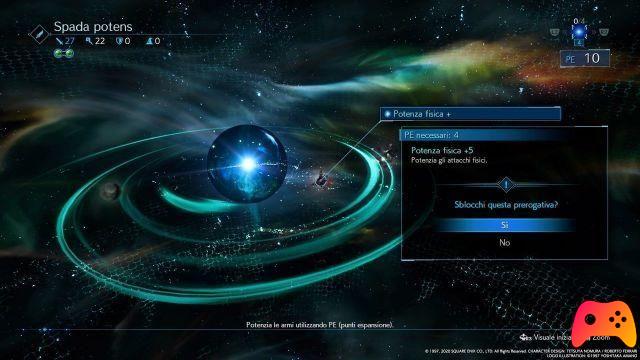
The battle system of Final Fantasy VII Remake is surprisingly eclectic and the use of characters on the field to support teammates or move from the trajectories of attacks requires good tactical skills and timely adaptation. This is also due to the fact that the bosses are not only significantly more difficult than in the original game, but during the course of the fight they will change their approach and add new deadly attacks to their repertoire. The gameplay therefore poses a good balance between command planning and adrenaline-pumping action. Mastering its mechanics to the fullest will then be fundamental in the last confrontations of the adventure, but even more so if you want to try your hand in the Hard mode that will unlock after the credits (along with new quests) and which provides a truly remarkable level of challenge.
There are few flaws in what we have found to be a more than satisfactory game system. Unfortunately, it is not uncommon for the most intense fights to create a certain confusion on the screen, especially when animations and various particle effects overlap; fortunately the tactical pause is always available to (almost) stop the action and allow us to look around and orient ourselves again. This pause is also very useful to mitigate another mole, namely the camera. Given the particularly energetic movements in the fighting, on several occasions our view was obstructed by an obstacle or in any case it was not optimal; the ability to zoom out more would have allowed better control of the situation. On closer inspection we should consider that the Final Fantasy VII Remake camera is a widespread problem that afflicts the vast majority of titles, even excellent ones, with an action component, from Bayonetta to Dark Souls, up to God of War.

Much of the involvement in the game action, but in general at any moment of the adventure, is to be recognized by its majestic sound sector. Joint work of the master Nobuo Uematsu together with Masashi hamauzu (SaGa Frontier 2, Final Fantasy XIII, The Legend of Legacy, World of Final Fantasy) e Mitsuto Suzuki (Mobius Final Fantasy, Final Fantasy XIII-2, Lightning Returns: Final Fantasy XIII), the soundtrack of Final Fantasy VII Remake brings new vigor to the classic tracks, rearranged and orchestrated for the occasion, and joins new tracks created specially. Especially memorable are the themes of the boss battles with their fast and solemn rhythms with their harmonic use of percussion, strings, electric guitars and even choirs; a symphonic charge that could inflame any apathetic. We said “the” themes because there are several battle themes and even more arrangements than the original ones, one more evocative than the other. Also admirable is the implementation of a “fluid” accompaniment between the exploration phase and the combat that creates an uninterrupted musical continuum, without jolts and dead times. Finally, the new song "Hollow" in the credits is really inspired, which makes us emerge from the confusion of the ending to give us an intimate interpretation of the character of Cloud.
Alongside the music we find a more than satisfactory English dubbing. We will avoid going into the question of the disharmony between English dialogues and subtitles, which we have already addressed in our editorial. Instead, we point out that, in addition to quality, the dubbing of the game can count on a large amount of dialogues. Each character we interact with will be fully voiced, even random passersby have their own voices and lines. Particularly effective are the recurring comments of the characters even during exploration, which are added to the soundtrack to keep us company in the exploration and make the personal between them more real.

Final Fantasy VII Remake is not the original game, and it doesn't want to be. It celebrates it, it pays homage, but it also wants to go further. He walks in the balance between respect for the parent and the desire to tell more, to renew, to give us even more emotions than in the past. It is understandable and reasonable to be perplexed by the choice of the episodic formula, but after years of remakes almost all characterized by an intrinsic lack of imagination, it would be paradoxical to criticize a project that rolls up its sleeves in a new creative process to give life to a enriched and in-depth experience. Square Enix's commitment to this is palpable in every aspect of its creation and the results are impressive. The real, big misstep of the production lies in that imprudent and inopportune ending, which we hope will be resized as early as the next chapter.
► Final Fantasy VII Remake is an Action-RPG type game developed and published by Square Enix for PlayStation 4, the video game was released on 10/04/2020
Deprecated: Automatic conversion of false to array is deprecated in /home/epictrick.com/htdocs/php/post.php on line 612






